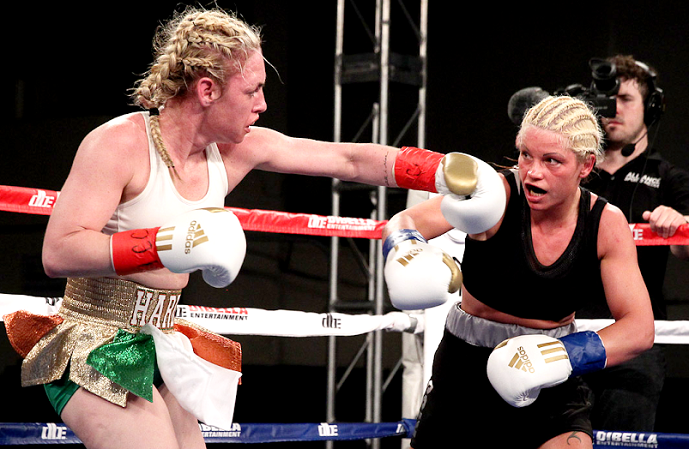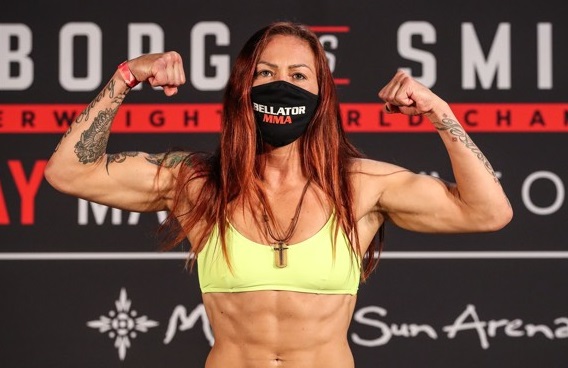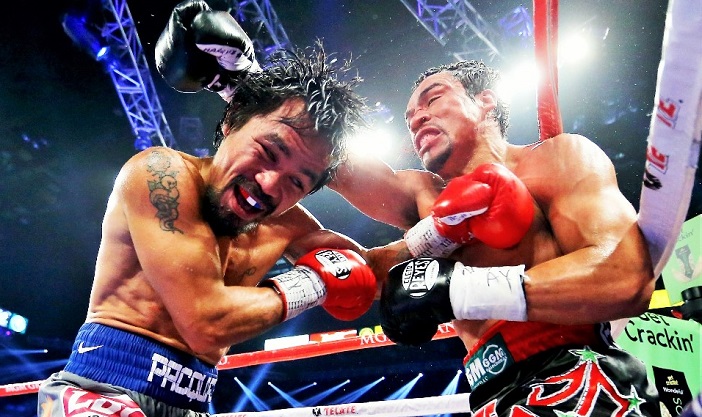The Loneliest Warriors
When Szilvia Szabados landed in Detroit shortly before midnight on March 6, 2017, she knew she was walking into hostile territory. The Hungarian challenger flew nineteen hours from her hometown of Miskolc to fight Detroit’s adopted golden girl, Claressa Shields. It was not her first match in America, but it was her first in Detroit, and given the city’s history and Shields’ background, Szabados knew that fighting here was going to be different.
Detroit is a city that has been wronged in so many ways. When America’s car manufacturers started to move their facilities to lower cost locations starting in the 1950s, Detroit and Shields’ hometown of Flint started a long, slow descent into economic malaise, a decline which led to mass poverty. Destitution led to crime, and both scared business away. Detroit is now a city eager for something positive, something beyond the steady diet of negative media stories. Shields, a two-time gold medalist and one of the most dominant boxers to come out of the London and Rio Olympics, gave the city something to be proud of.
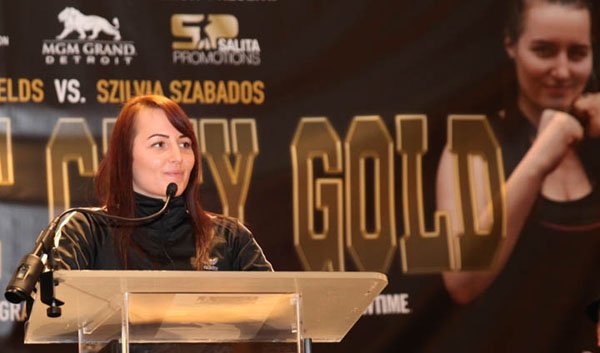
On March 10, 2017, “The Motor City” rallied around their champion for her second professional fight, and as Szabados was introduced to the audience, the crowd booed and jeered. The object of their scorn responded by playfully blowing kisses to Shields’ hometown crowd. “That was the first time in my career when the spectators loudly booed me,” Szabados admits, but she refused to be disturbed by it. “This was a show after all, and in my mind I knew this.”
Such is the life of challengers, the opponents who are called upon to help build the records of promising young prospects or to prepare an existing champion for a bigger fight. Challengers are road warriors, boxers who fight in enemy territory where the odds are overwhelmingly stacked against them. In women’s boxing, two such challengers are Szabados and Edina Kiss, both from Hungary, both having fought some of America’s most well-known female champions in recent months.
Shortly after fighting Shields in Detroit, Szabados, 26, defeated Katalin Menes before journeying to Las Vegas in April to battle Layla McCarter, a six-time world champion who is considered one of the best pound-for-pound female fighters in the world. Szabados fought valiantly but was stopped by McCarter in round seven. Meanwhile, Edina Kiss faced the current WBC international featherweight titleholder Heather Hardy on March 4, and again on May 18.
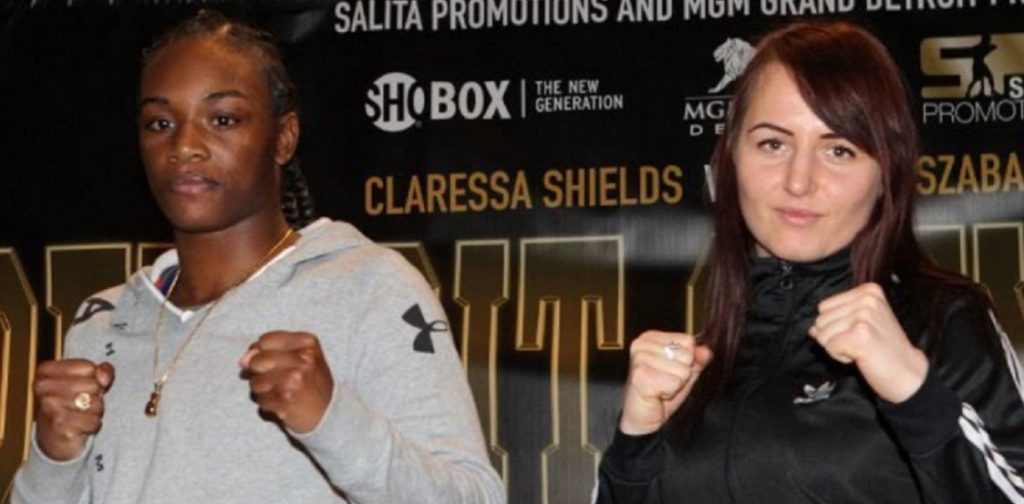
Between the two road warriors, Szabados has had the longer professional career, with a record of 16-10-0. She’s had fights not only in her native Hungary, but also in Slovakia, Germany, the United Kingdom, South Africa and the United States. All her losses were on foreign soil and include setbacks against boxers such as Mikaela Lauren of Sweden and Nikki Adler of Germany. In Detroit, Szabados lost to Shields by TKO in the fourth round, and she battled valiantly against McCarter before the match was stopped after Szabados absorbed a barrage of vicious body punches.
Since turning professional in 2015, Kiss has built a record of 14-4-0. A native of Budapest, she too has fought in Slovakia, Australia and the United States. A year ago, she travelled to Puerto Rico to face then four-time world champion Amanda Serrano in what Kiss considers her most difficult bout. The hard-punching Serrano, who has since won a fifth title, dealt Kiss her only loss inside the distance.
What is most striking about these challengers is the calm and ease they exude as they navigate hostile territory, as well as the graciousness they exhibit in defeat. Weigh-in pictures of Shields and Szabados showed the Hungarian boxer smiling, enjoying herself, seemingly unfazed by Shields’ intensity. While Szabados disagreed with the fourth-round stoppage of their bout, there was no post-fight controversy or dispute. Kiss, on the other hand, went toe-to-toe with Hardy in both of their fights, and once the contests were over, both combatants posed together for post-fight pictures.
I was intrigued by the women who were willing to take such risks and battle American champions on American soil. Who are they and what makes them do what they do?
Szabados agreed to respond by email, and I met with Kiss and Zoltan Petranyi, who manages both women, on May 19, the day after the Hardy-Kiss rematch in Manhattan. At about 12:45, both arrived at the Stewart Hotel with their luggage in tow. As Petranyi checked both of them in and worked out room assignments, Kiss sat by herself in the lobby, just another guest in one of Manhattan’s historic hotels on a balmy Friday. She is unknown in this part of the world. No one snaps a photo or requests a selfie.
Petranyi suggested we chat in the Starbucks across the street. They had an hour to kill before they needed to go to Madison Square Garden for the weigh-in of another one of Petranyi’s fighters who was scheduled to box on the undercard of the Terence Crawford vs Felix Diaz match.
Eastern Europe has produced a number of great fighters, but the successful ones have made their fortunes abroad, which is certainly the case in Hungary. “Hungary is not a big boxing country,” says Petranyi. While there are many Hungarian boxers, they are not motivated to box competitively. “There is no motivation because they have to travel abroad and they always lose,” he said.
Indeed, the chances of a challenger winning against a hometown fighter is so slim that Petranyi warns his boxers that “it is very difficult to win fights in a foreign land.” The hometown crowd, judges — all the factors that make the sport highly subjective — often work against the challenger (not to mention the jet lag). Challengers often arrive less than week before the fight, and depending on how far they had to travel from, the time change can be grueling.
Petranyi, himself a professional boxer who has amassed a 55-22-0 record during his 20-year career, is also a road warrior, with matches in Slovakia, Spain, Finland, Italy, France, Luxembourg, Belgium, Germany, the United Kingdom, and even Curacao. Most of his losses were suffered in international bouts. In 2015, at the age of 47, he traveled to Panama to battle American heavyweight Shannon Briggs but lost by KO. Yet he continues to box, having won four fights in Hungary in 2017, at the ripe age of nearly 50.
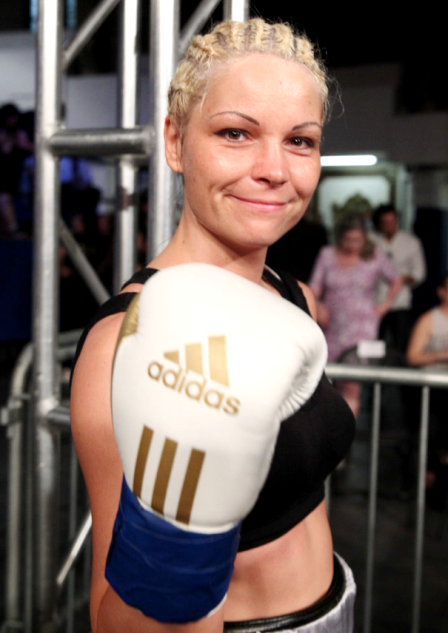
“When I am abroad and I step into the ring, I can only give what I have,” writes Szabados. “Sometimes envy spreads in me when I think how my opponents have very different options. For them, everything is set. They get support from everywhere. They even benefit from the screaming of their hometown fans. That can help a lot during a fight.”
So what makes Szabados and Kiss leave Hungary, where they have won national championships, to compete abroad where they are bound to lose? Petranyi points a finger to his temple. “The mental state,” he answers. “Edina and Szilvia are mentally strong. Women are mentally stronger.”
Indeed, it takes courage to fight in hostile territory and tenacity to put on a performance in front of a crowd that craves their demise.
“I knew she was talented, and she gets more attention,” says Szabados of her fight against Shields. “But I have to concentrate on what I need to do. I cannot let these things scare me. I had to block this from my mind and just be relaxed and concentrate on the harmony I felt on the inside.”
When Szabados or Kiss travel, Petranyi serves as manager, coach and translator. On the day of Kiss’ fight with Hardy, Petranyi took her to a salon in Brooklyn to have her hair braided. Both fighter and manager fly in with no fanfare and afterwards both leave as quietly as they arrive.
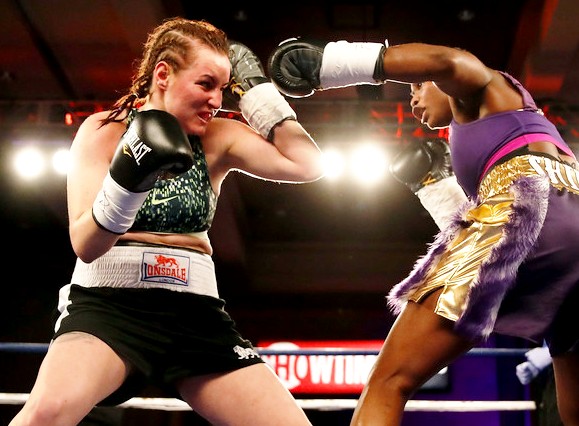
Back in Hungary, Szabados and Kiss lead lives that are similar to those of the women they fight in America and Europe. Women boxers in Hungary need to make a living outside of the sport. There are no sponsors to support their training and little prize money from fighting.
Kiss works as a real estate agent in Budapest and has an eight-year-old daughter. As is the case for all single parents, training while holding a day job and taking care of her child is “not easy.” She can only work out in the evenings after finishing her day job, which necessitates being in fighting shape at all times because a call from a foreign promoter might come at any minute. She trains with her boyfriend who is also a professional boxer.
“We receive offers a few days or a few weeks before the fight, so we have to be in training all the time,” Petranyi explains. In her first fight with Hardy last March, Kiss was brought in as a last-minute replacement for Nigerian boxer Helen Joseph. Kiss stepped up to the challenge, going the full eight rounds with the undefeated Brooklyn native at the Barclays Center in what was one of the more exciting fights on the Keith Thurman-Danny Garcia undercard. Two months later Kiss returned to Brooklyn, her skills visibly improved. “She came in stronger than in the first fight but Heather was also stronger,” said Petranyi.
Szabados, meanwhile, works as a logistics manager at a German engineering and electronics company, all while studying economics at Miskolc University. With a full-time work schedule, training can only be part-time.
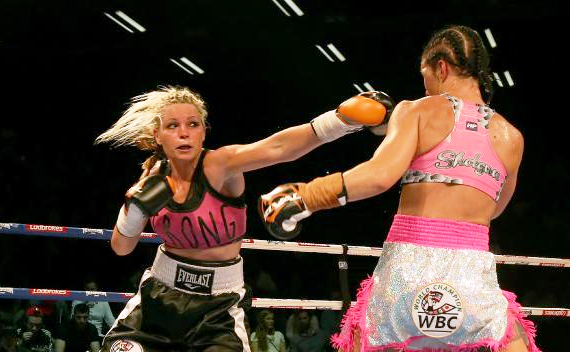
“For my boxing career, I try to put my all into it. Sometimes I feel the lack of mental and technical help, but I am able to accept it. It is what it is. I am a lonely and independent fighter,” states Szabados. “Few know about my background, that I have no sponsors. I do not even have a head coach.”
Szabados lives in Miskolc, an industrial city 180 kilometres from Budapest (where Petranyi’s promotional company is based). This distance means that she must train by herself, working with different coaches and sometimes training in Muay Thai to be able to spar with another woman in her weight class. She ‘s even managed to enlist her boyfriend as a training partner.
Despite the difficulties in balancing work and training, Szabados and Kiss have taken on risks that would have scared off less courageous and stoic boxers. Szabados said the opportunity to compete against big name boxers has taught her “how to fight against different styles” and has given her “plenty of experience.” By doing so, she has earned the respect of her American opponents. McCarter, who stopped Szabados in the seventh, said she was “happy for the stoppage against someone so tough.”
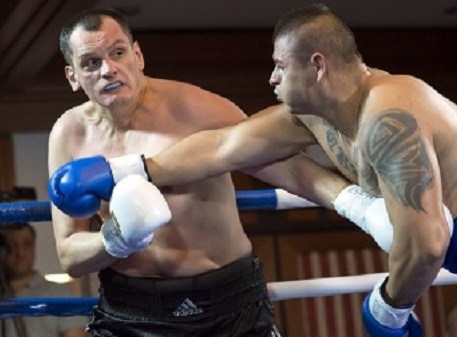
Similarly, Szabados absorbed tremendous punishment from both Shields and Mikaela Lauren before losing by TKO. I asked her where the heart and courage comes from to keep fighting under such circumstances, to which she replied, “It is a good question. I do not know where it comes from. It is probably because I had a difficult childhood. It was a stormy and stressful one. Everybody has instincts and wants to win. It is just that some give up too early, while others never do. My motivation is my heart.”
The role of challengers like Kiss and Szabados should not be underestimated. In women’s boxing, where depth is still lacking, they are critical to advancing the sport. They provide precious experience to promising young fighters, while keeping seasoned boxers on their toes. And because they are crafty, experienced veterans, they are able to deliver performances that satisfy promoters and audience alike.
Petranyi’s hope is to keep both women busy, and this means getting offers for quality international matches. However, the consistency of this is dependent on delivering exciting performances. Fan appreciation helps ensure the longevity of Petranyi’s business relationships and keeps his fighters marketable. Petranyi was satisfied with the Hardy-Kiss rematch on May 18, noting that people came up to them to congratulate Edina on her performance. Hardy and Kiss headlined Broadway Boxing, a local event promoted by New York promoter Lou Di Bella. It was a predominantly pro-Hardy crowd, but they responded favourably to Kiss’ fighting spirit. Indeed, if circumstances were somewhat different, a true Heather Hardy-Edina Kiss rivalry might have been possible.
Ultimately, challengers are human, and when I asked Edina questions about the May 18 bout, I sensed her disappointment. Fighters train to win, and challengers don’t fly halfway across the world without believing that victory is possible. But as Szabados points out, “There is no shame in getting beaten by a more seasoned and experienced opponent. Especially when you know that you gave your all in the ring.”
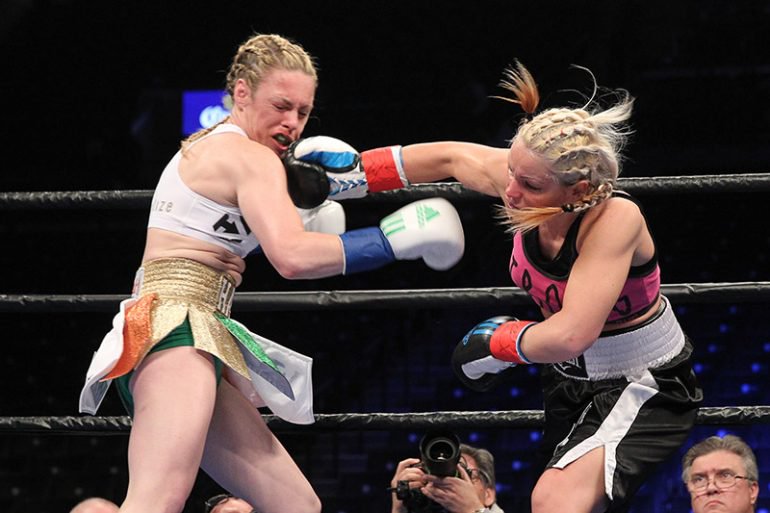
After our interview, Petranyi, Kiss and I stand and exchange our goodbyes. It was time for them to head over to the Garden. I watched Kiss walk away from Starbucks, where we had spent 45 minutes conversing, her hair blending in among the sea of tourists in midtown Manhattan. Nothing in her countenance suggested that just one night before she had faced a world champion and fought valiantly.
Any boxer will tell you that pugilism is a lonely sport because when the bell rings, the fighter leaves their team and loved one behind to battle unfathomable adversary alone. However, win or lose, the hometown fighter has their family and team waiting for her outside the ring and draws strength from their support. Meanwhile, the challenger has only herself and her small team. Even in victory, there is no lonelier boxer than the “opponent,” the underdog challenger who almost everyone hopes will lose. And female road warriors like Szabados and Petranyi are among the loneliest and bravest of them all. — Sheila Oviedo
(Ed. Note: The interview with Szilvia Szabados was translated to English from Hungarian, and Zoltan Petranyi translated on behalf of Edina Kiss.)

